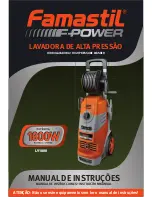
3
- EN
2 Installation
Removing packaging
reinforcement
Tilt the machine to remove the packaging
reinforcement. Remove the packaging
reinforcement by pulling the ribbon.
Opening the transportation locks
A
Transportation safety bolts must be
removed before operating the washing
machine! Otherwise, the machine will be
damaged!
1. Loosen all the bolts with a spanner until
they rotate freely (“C”)
2. Remove transportation safety bolts by
turning them gently.
3. Fit the covers (supplied in the bag with the
Operation Manual) into the holes on the
rear panel. (“P”)
C
Keep the transportation safety bolts in
a safe place to reuse when the washing
machine needs to be moved again in the
future.
C
Never move the appliance without the
transportation safety bolts properly fixed in
place!
Adjusting the feet
A
Do not use any tools to loosen the lock
nuts. Otherwise, they can be damaged.
1. Manually (by hand) loosen the lock nuts on
the feet.
2. Adjust them until the machine stands level
and firmly.
3. Important: Tighten all lock nuts up again.
Connecting to the water supply.
Important:
• The water supply pressure required to run
the machine must be 1-10 bar (0,1 – 1
MPa).
• Connect the special hoses supplied with
the machine to the water intake valves on
the machine.
• If you are going to use your double water-
inlet machine as a single (cold) water-inlet
unit, you must install the stopper*, supplied
with your machine to the hot water valve.
• If you want to use both water inlets of the
product, you can connect the hot water
hose after removing the stopper and
gasket group from the hot water valve.
* Applies for the products supplied with a blind
stopper group.
• Models with a single water inlet should not
be connected to the hot water tap.
When returning the appliance to its place after
maintenance or cleaning, care should be taken
not to fold, squeeze or block the hoses.
Connecting to the drain
The water discharge hose can be attached to
the edge of a washbasin or bathtub. The drain
hose should be firmly fitted into the drain as to
not get out of its housing.
Important:
• The end of the drain hose must be directly
connected to the wastewater drain or to
the washbasin.
• The hose should be attached to a height of
at least 40 cm, and 100 cm at most.
• In case the hose is elevated after laying it
on the floor level or close to the ground
(less than 40 cm above the ground), water
discharge becomes more difficult and the
laundry may come out wet.
• The hose should be pushed into the
drainage for more than 15 cm. If it is too
long you may have it shortened.






























